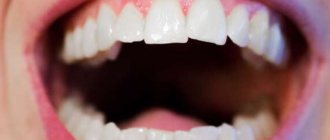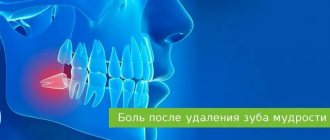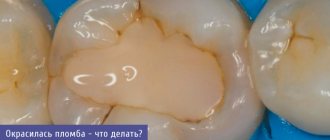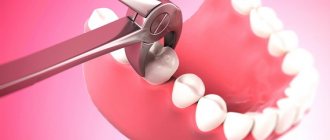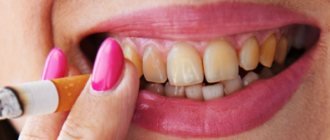Possible causes of toothache
Let's figure out why teeth sometimes hurt a lot. The main reason is damage to the teeth themselves and the tissues surrounding them. Most often, such pain occurs with the following dental pathologies2:
| deep caries | destruction of hard tooth tissues located close to the “nerve” - the pulp |
| pulpitis | inflammation of the pulp when microorganisms and the toxins they release enter it |
| periodontitis | inflammation of the periodontium - the tissue that holds the tooth in the jaw |
| injuries | mechanical damage to hard dental tissues - bruises, dislocations and fractures4 |
Nature of toothache
The most common reason why a tooth starts to hurt is caries3. At an early stage, painful sensations from sweet, sour, hot or cold foods may appear. Discomfort disappears immediately after the cessation of the stimulus2. The deeper the caries, the stronger and longer the pain is felt3.
Gradually, the carious process progresses, the tooth pulp becomes inflamed and pulpitis develops. This disease is characterized by severe, spontaneous, throbbing pain, radiating to adjacent teeth, temple, ear and even eyes, and worsening in the evenings and at night3.
Advanced pulpitis leads to the development of a more serious disease—periodontitis. A pronounced aching pain appears, which increases when biting or pressing on the tooth3. Patients often complain about the “feeling of a grown tooth”3.
Trauma is the second most common cause of damage to the integrity of tooth tissue after caries4. Symptoms depend on the degree of damage and can manifest as short-term pain when touching a tooth, or sharp pain from mechanical and temperature stimuli4.
Another reason why people go to the dentist is pain during the eruption of wisdom teeth. This process is characterized by the following symptoms: aching pain in the tooth area, pain when opening the mouth and swallowing, fever, swelling of the mucous membrane and soft tissues of the face5.
Top
Causes of pulsation
Common causes include exacerbation of oral diseases, dental injuries, consequences of poor-quality treatment, temporary condition after dental procedures, and dental hypersensitivity. You won’t be able to get rid of these reasons at home on your own, and they may even make the situation worse. The longer you put off going to the doctor, the more serious the consequences: the need for surgical intervention or loss of teeth. There are other reasons for pulsation.
Pulsation of the tooth under the filling. If the filling is temporary, pain is allowed for two days after its installation. Temporary fillings are often placed because of pulp pain, in order to relieve the patient of discomfort and to observe the body’s reaction to foreign material. In this case, sometimes a medicine is placed under the filling that kills the nerve. This may cause pain. If the filling is permanent, only a doctor can make a diagnosis after diagnosis.
Pulsation of the tooth under the crown. Here we are talking about two options: either an infection got under the crown during installation, or the nerve was poorly treated before installation. It is difficult to correct the problem in both cases - you will have to open the crown, which is not a pleasant process. But otherwise, you may lose the entire tooth.
Pulsation after tooth extraction. The pain can be temporary and even long-lasting if a wisdom tooth is removed, the soft tissues of the oral cavity are damaged (the gums are cut, for example), or surgery is performed to remove a dental unit. But there is a more dangerous option - suppuration of the empty hole. When a tooth is throbbing due to a purulent formation, home treatment is strictly prohibited! Contact your doctor, he will clean the hole and prescribe medication.
Pulsation without pain. This phenomenon is possible as a result of apical periodontitis (pus accumulates and gives a pulsating sensation) or periodontitis (inflammation of the tissues surrounding the tooth). If the area in the mouth is pulsating, there may be no pain in the tooth, but this does not mean that your health is safe. Advanced periodontitis is dangerous due to the development of sepsis (purulent infection), perimandibular abscess (a purulent tumor appears on the jaw) and the appearance of other diseases, including chronic ones.
Pulsation of teeth may not be associated with oral diseases. Other reasons include: diseases of the gastrointestinal tract, liver, development of sinusitis. In these cases, the pulse in the teeth is accompanied by a general deterioration in the condition of the body. What to do? First of all, contact your dentist. If he confirms that your teeth are healthy, contact your therapist, he will give you a referral to a specialized doctor.
How to relieve pain
Experts believe that pain should never be tolerated. It definitely needs to be stopped, because it harms the body - it disrupts the immune system, hormonal balance, etc.2. Severe pain can even affect mental balance, so the use of painkillers for toothache is a necessary measure to maintain physical and mental health2.
Nonsteroidal anti-inflammatory drugs (NSAIDs) are widely used in dental practice6. If you're looking for tablets that can help with toothache, look no further than Motrin®. This is a universal pain reliever whose active ingredient is naproxen8. It has not only a pronounced analgesic, but also an anti-inflammatory effect7.
Naproxen-based medications help relieve toothache and last up to 12 hours10.
Be aware that uncontrolled use of NSAIDs can lead to serious gastrointestinal, cardiovascular and renal complications7. Therefore, under no circumstances should you engage in self-diagnosis or self-medication - take any medications only as prescribed by your doctor. Do not forget that at home, taking remedies for toothache can only relieve the pain for a short time, and not cure the tooth, so an analgesic drug is only a temporary measure. Once the pain pill wears off, the pain will return.
Top
Helping children with acute toothache
It's impossible to predict
Vacations outside the city, weekends and holidays can be ruined by toothache. For some reason, it always starts at the very moment when there is no way to see a doctor.
To prevent such a nuisance from turning fun weekends and days of horror, you need to regularly visit the pediatric dentist. An experienced doctor will conduct a thorough examination of the entire oral cavity and tell you about any existing problems. If necessary, he will prescribe treatment and preventive procedures. Although this will not give a one hundred percent guarantee that your teeth will not start to hurt in a month, there will be more chances to spend a relaxing vacation away from the dentist’s office. It is advisable to carry out such inspections before leaving for the sea, abroad, to a village or to a children's camp. Finding a dental clinic in such places is problematic. In addition, the dentist will always be able to give advice on what to do if a sharp toothache takes you by surprise.
What hurts the most?
For children, the most unpleasant pain is the pain that occurs during exacerbation of chronic diseases: pulpitis and periodontitis.
Pulpitis
This disease can be suspected by aching pain. As a rule, they begin at night or in the evening. All unpleasant sensations may completely disappear by the morning and reappear in the evening. Pulpitis can also manifest itself in the form of prolonged pain, which intensifies while chewing food. If you examine children's teeth yourself, it is very difficult to determine the disease. Sometimes it is not possible to find anything other than a small “hole”.
When the aching pain lasts for several hours, it begins to “spread” to the neighboring teeth. After a while, it is difficult even for an adult to tell which tooth hurts. And it is even more problematic for a child to point out the source of pain. This complicates the diagnosis of the disease, since it is difficult to determine where to look.
Suspected pulpitis - see a doctor immediately
Pulp is the soft tissue inside the tooth. They are rich in nerve endings and blood vessels. With pulpitis, this bundle begins to become inflamed. At first there may be no pain at all. But over time, the disease begins to manifest itself. If you do not consult a dentist, complications may arise. Inflammation (periodontitis, abscess) gradually spreads to healthy tissues that are located around the diseased tooth. It is very painful and dangerous. Therefore, you cannot do without the help of a specialist.
The doctor will remove all affected areas of the tooth, apply a special medicine to the area of inflammation, and then restore the tooth to its original shape with filling material. If too much hard tissue is removed during treatment, a crown will be placed. All these procedures do not occur in one day. We must prepare for long-term treatment, which can last up to a month.
But! You can save a tooth only if you consult a doctor in time.
What to do before being examined by a doctor?
First of all, the child needs to relieve the pain. Any painkillers approved for children are suitable for this. When a child grows up in the house, as a rule, they are always in the first aid kit (Nurofen, Panadol, etc.). In such cases, it is not worth experimenting with drugs; it is best to give the baby a proven medicine that has helped him before. The doctor will do the rest. It is very important not to put off visiting the dentist, even if the pain completely disappears. An anesthetic cannot cure a diseased tooth, it only eliminates the symptoms of the disease.
Important! You cannot treat a bad tooth yourself, for example, pour crushed aspirin into the “hole”. This will only make the situation worse.
The disease does not go away on its own - there are no miracles
There are situations when a visit to the dentist is impossible for several days, and sometimes even a week. After such a long period, the pain may subside or go away completely. But this does not mean that the disease has passed. The period of exacerbation simply ended, and pulpitis became chronic. The pus could have passed away unnoticed through a hole in the gum, which parents often call a “pimple.” But the infection has not gone away from the body. The inflammation still continues, the child just doesn’t feel it. The infection can penetrate into the molar that is about to grow in this place, or spread throughout the body.
Exacerbation of pulpitis usually begins during a decrease in immunity. The pain occurs simultaneously with a cold or hypothermia.
At this moment, the number of unpleasant symptoms increases:
- The tooth hurts constantly. The pain intensifies while eating.
- The gums around the tooth become red and swollen.
- A fistula tract is formed. The body tries to remove pus through it.
- The tooth begins to loosen.
- The temperature rises, and the face on the side of the diseased tooth may swell.
When the situation has progressed to such signs, there is practically no chance of saving the tooth. And removing a tooth with severe inflammation is very painful. The anesthesia is not always fully effective and the entire process is very sensitive.
How to help your child at home
First of all, it is pain relief. You can give any medicine in the dose allowed for the child’s age. Nurofen, Panadol and other drugs are suitable. To relieve swelling at the site of inflammation, you can make a mouth bath. To do this, add a teaspoon of baking soda and salt to a glass of warm water. The solution should be taken into the mouth and held for one minute. You can do this bath up to five times during the day.
Carefully! Wrapping the area of inflammation in warm clothes is strictly prohibited. As the temperature rises, the rate of the inflammatory process increases. Because of this, the infection begins to spread to healthy tissue even faster. And the lesion becomes larger every minute.
Remember, first aid for toothache does not apply to medical procedures! It only eliminates the pain and makes the situation easier. The cause of pain can only be detected and treated by a specialist. Therefore, it is imperative to show your child to the dentist. He will make a diagnosis and carry out complete treatment.


